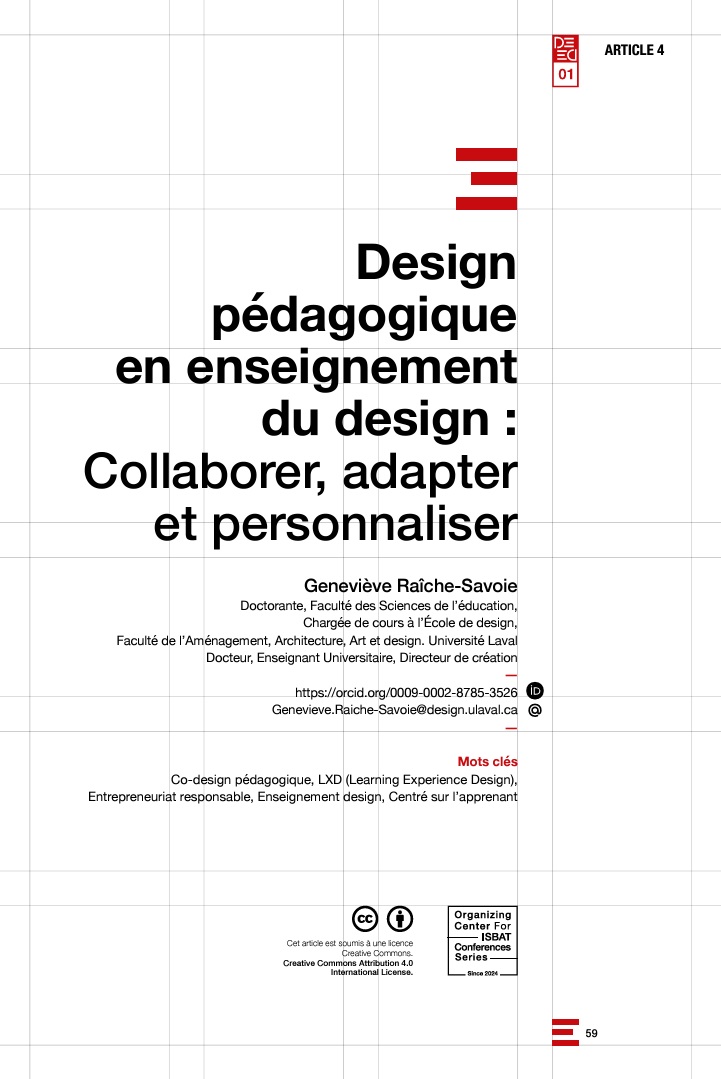Abstract
The evolution of design education is essential to prepare designers to engage in complex problem-solving requiring a global vision and collaboration between different stakeholders. Future designers must acquire the skills to design projects that are socially, environmentally, and economically responsible and sustainable. This article presents preliminary results from doctoral research focused on Learning Experience Design (LXD), aimed at designing a learning experience tailored to the graphic design student body at Cégep de Sainte-Foy in Quebec City, Canada. LXD focuses on creating learner-centered learning experiences, fostering positive emotions and cognitive engagement through active learning. The research presented also introduces the concept of responsible entrepreneurship education, aimed at developing an entrepreneurial spirit and raising students' awareness of the impact of their design projects on society and the environment. The methodology of this mixed-methods research included a co-design workshop involving the student body, teaching staff, and support members specialized in pedagogical advice and responsible entrepreneurship, intending to generate ideas for the development of a responsible entrepreneurial learning experience. A questionnaire then revealed a strong preference among the student body for the idea of the “creative retreat”, which offers immersive and personalized learning. This research highlights the importance of a collaborative approach to instructional design, tailored and focused on personalizing learning for aspiring designers.
References
Aguilera, T. Chevalier, T. (2021). Les Méthodes Mixtes Pour La Science Politique. Revue française de science politique. Vol. 71, no. 3 (2021): 365-89.
Ballereau Valérie, Pepin, M., Toutain, O., & Tremblay, M. (2020). La formation à l’entrepreneuriat durable et responsable : un champ scientifique et pédagogique en émergence. Entreprendre & Innover, 45(2), 5–5. https://doi.org/10.3917/entin.045.0005
Ben-Hafaïedh, C. (2020). Se former en rendant service à la communauté : quand des étudiants se font consultants pour des organisations sociales. Entreprendre & Innover, 45, 69-80.
Berthet, S. (2016, 1er décembre). Design d’expérience apprenant : placer les émotions au cœur de l’apprentissage. Medium. (Consulté le 6 janvier, 2023). https://medium.com/@SoleneBerthet/design-dexp%C3%A9rience-apprenant-placer-les-%C3%A9motions-au-coeur-de-l-apprentissage-af809154396d
BIE - Bureau de l’international et de l’entrepreneuriat. (2022). De l’idée à l’action : Contribuer au développement des habiletés essentielles par le biais de l’esprit d’entreprendre. Document d’orientation institutionnel Cégep de Sainte-Foy. 1er novembre 2022.
Conseil des arts et des lettres du Québec. (2009). Conseil des arts et des lettres du Québec creative residencies : Paris, Rome, Buenos Aires, London, Tokyo, Berlin, Mexico City, Lyon, Barcelona, Montréal, Inukjuak, Gatineau, Québec City. Conseil des arts et des lettres du Québec. http://collections.banq.qc.ca/ark:/52327/1972546
Creswell, J. W. (2022). A concise introduction to mixed methods research. Second Edition. SAGE.
ELM (ELM Learning). (2022, 27 octobre). What is Learning Experience Design? ELM Learning. (Consulté le 6 janvier, 2023). https://elmlearning.com/learning-experience-design-everything-you-need-to-know/
Fayolle, A., & Gailly, B. (2008). From craft to science: teaching models and learning processes in entrepreneurship education. Journal of European Industrial Training, 32(7), 569–593.
Findeli, Alain. (2001). Rethinking Design Education for the 21st Century: Theoretical, Methodological, and Ethical Discussion. Design Issues. 17. 5-17. 10.1162/07479360152103796.
Floor, N. (2016, 28 septembre). This is Learning Experience Design. LinkedIn. (Consulté le 6 janvier, 2023).https://www.linkedin.com/pulse/learning-experience-design-niels-floor
Floor, N. (2023). This is Learning Experience Design: What it is, how it works, and why it matters. New Riders; 1ere édition (7 février 2023).
Galaykova, M. (2021, 15 mai). Learning Experience Design — get to know the elephant. Medium. (Consulté le 6 janvier, 2023). https://galayketti.medium.com/learning-experience-design-get-to-know-the-elephant-385c5e9c259d
Hägg G. & Kurczewska, A. (2020). Towards a learning philosophy based on experience in entrepreneurship education. Entrepreneurship Education and Pedagogy, 3(2), 129–153. https://doi.org/10.1177/2515127420910679
Haylock, B. (2020). “Problem formulation is the problem” dans Haylock, B. et Wood, L. (Eds.) One and many mirrors: perspectives on graphic design education. Occasional Papers. ISBN 978-0-9954730-1-0
IcoD - International Design Council. (2020, 10 août). Disruption is an opportunity for change: What role can designers have in creating the new normal? (Consulté le 6 janvier, 2023). https://www.theicod.org/en/resources/news-archive/disruption-is-an-opportunity-for-change
Kakangu, M. M. (2007). Vocabulaire de la complexité. Harmattan.
Kakouris, A., Liargovas, P. (2021). On the about/for/through framework of entrepreneurship education: a critical analysis”, Entrepreneurship Education and Pedagogy, 4(3), 396 – 421, DOI: 10.1177/2515127420916740
LXD (Learning Experience Design). (2023, 6 janvier). Learning Experience Design Basics. https://lxd.org/fundamentals-of-learning-experience-design/
Meyer, M. W. & Don, D. (2020). Changing design education for the 21st century. She Ji: The Journal of Design, Economics and Innovation, 6(1), (p. 13–49).
Nagels, M. (2022). Les méthodes mixtes, une perspective pragmatique en recherche. Traité de méthodologie de la recherche en Sciences de l’éducation et de la formation. Enquêter dans les métiers de l’humain. https://hal.science/hal-03857724
Noël, G. (2020b). Fostering design learning in the era of humanism. She Ji: The Journal of Design, Economics and Innovation, 6(2), 119–128. https://doi.org/10.1016/j.sheji.2020.05.001
Pepin, M., Audebrand, L. K., Tremblay, M., & Keita, N. B. (2021). Evolving students' conceptions about responsible entrepreneurship: a classroom experiment. Journal of Small Business and Enterprise Development, 28(4), 570–585
Pepin, M. (2015). Apprendre à s'entreprendre en milieu scolaire : une étude de cas collaborative à l'école primaire (dissertation). Université Laval.
Pepin, M., Tremblay, M. et Audebrand, L.K. (2017). L’entrepreneuriat responsable : cadre conceptuel et implications pour la formation. Document de travail 2017-008, Faculté des sciences de l’administration, Université Laval. ISBN 978-2-89524-451-6.
Roberts, J. (2012). Infusing Entrepreneurship within Non-Business Disciplines: Preparing Artists and Others for Self-Employment and Entrepreneurship. Artivate 1 (2), 53–63.
Schmidt, M. & Huang, R. (2021). Defining Learning Experience Design: Voices from the Field of Learning Design & Technology. TechTrends. 66. DOI:10.1007/s11528-021-00656-y.
Tessier-Dargent, C. (2023). Comment un dispositif innovant d’éducation à l’entrepreneuriat « freirien » peut-il favoriser l’entrepreneuriat responsable chez les étudiants ? Entreprendre & Innover, 2023/3 n° 56. pp. 92-100. https://doi-org.acces.bibl.ulaval.ca/10.3917/entin.056.0092.
TransArtists. (n.d.). What are residencies? Consulté le 28 juin, 2024. https://www.transartists.org/en/what-are-residencies
Valencia, A., Lievesley, M., & Vaugh, T. (2021). Four mindsets of designer-entrepreneurs. The Design Journal, 24(5), 705–726. https://doi.org/10.1080/14606925.2021.1958601
Wasson, B., & Kirschner, P. A. (2020). Learning Design: European Approaches. Techtrends : Linking Research and Practice to Improve Learning a Publication of the Association for Educational Communications & Technology, 64(6), 815–827. https://doi.org/10.1007/s11528-020-00498-0
Zamenopoulos, Theodore & Alexiou, Katerina. (2018). Co-design as collaborative research.

This work is licensed under a Creative Commons Attribution 4.0 International License.


